What is Auto Insurance Fraud?
When you purchase an auto insurance policy, you enter into a contract with the insurance-providing company. Under this contract, in exchange for the regular premium payments, the insurance provider agrees to cover the costs of any damage caused to your car or by your car to others in an accident. The auto insurance policy also covers car theft.
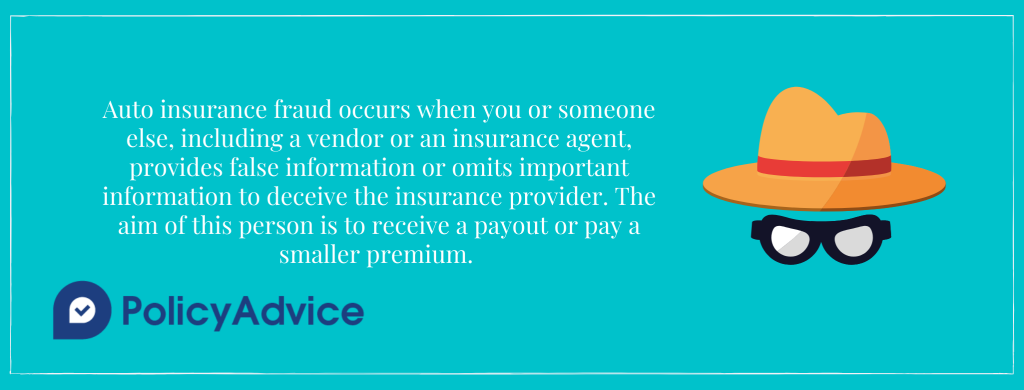
Auto insurance fraud occurs when you or someone else, including a vendor or an insurance agent, provides false information or omits important information to deceive the insurance provider. The aim of this person is to receive a payout or pay a smaller premium.
There are many ways in which unscrupulous people can commit this fraud. Here are a few of them:
- Providing incorrect information while getting a quote
- Misreporting the damage caused in an accident
- Staging a car accident
- Filing false injury claims
Top picks by the editor
- Personal-lines auto insurers in the US lose more than $29 billion a year in premium leakage.
- In 2016, fraud accounted for between 15% and 17% of total claims payments for auto insurance bodily injury.
- The national average annual car insurance premium in the US in 2019 was 23% higher than it was in 2011.
- No-fault scams are believed to have cost New Yorkers almost $2 billion between 2009 and 2018.
- Over 10 million Americans admit to having lied in their auto insurance applications.
Types of Auto Insurance Frauds
As is the case with insurance frauds in general, there can be many different ways in which the people involved in an auto insurance process can exploit the situation for ill-gotten benefits.
The most well-known types of auto insurance frauds are as follows:
- Application fraud – This involves providing false information on an insurance application form intentionally with the aim of getting a better deal on insurance premiums. Auto insurance fraud cases often involve false information such as reporting fewer miles per day driven by the vehicle, claiming that a commercial vehicle is used for personal purposes, lying about the usual parking location, and so on.
- Exaggerated claims fraud – These types of fraud involve people claiming more damage than has actually occurred to get a higher payout from the insurance company. Auto repair insurance fraud, where repair shops bill the insurance company for unnecessary repairs also falls under this category. Note that the exaggerated claims made by the policyholder could be in relation to the car damage or injuries to a person.
- False claims fraud – Here policyholders claim money for issues not covered in the policy or make false claims. Tactics used by car insurance fraudsters could include adding older issues with their vehicle to their accident claim, filing more than one claim for the same damage, or filing a claim for repairs never performed.
- Staged accidents or thefts – Crimes in this category include purposely damaging the vehicle to benefit from the comprehensive coverage of your auto insurance policy, claiming theft after hiding the vehicle, and staging an accident to make bogus claims for another vehicle owner’s insurance policy. These auto frauds fall under the category of hard fraud, going beyond lying or omitting facts.
- Agent fraud – This is a rarer type of fraud where the agent might not deposit the premiums paid by you, pocketing them instead. When you need the insurance company to pay up for any claims, you would realize that your policy has lapsed because of non-payment of premiums. Auto frauds by insurance agents can also be in the form of “sliding,” where the agent adds extra coverage to the policy without the policyholder’s knowledge, increasing the premium value.
- Illegitimate denial – Sometimes the fraud is committed by the insurance companies themselves. Denying valid insurance claims, denying coverage for issues that should be included in the policy, not investigating claims properly, and underpaying claims deliberately are some common automobile insurance frauds committed by unscrupulous insurance providers. Some companies even resort to sending confusing paperwork to the policyholder with the aim to confuse the person about extra charges or denied claims.
- Others – Apart from the above types, there are many other ways to commit fraud such as identity theft, towing scams, and the use of low-quality replacement parts. Windshield repair scams, which fall under the last category, are particularly popular among fraudsters.
Real-Life Car Insurance Fraud Examples
- In 1992, an eighteen-wheeler carrying cars on a Los Angeles freeway struck a Pontiac Firebird that had been swerving in and out of its lane. The drivers of the truck and the Firebird survived, but one of the car’s passengers died. It was later found that the truck had deliberately run into the Firebird. Often run by crime rings, this was an example of swoop-and-squat, which was a popular form of auto insurance fraud in California in the 1990s.
This fraud involved people staging car crashes with vehicles that looked to be well-insured. The scheme would involve doctors and lawyers at the top, middlemen who would find the victims and drive the car(s) deliberately crashing into another car, and participants in need of quick cash who would volunteer to be involved in the accident. Fraudsters could earn as much as $20,000 from each staged accident.
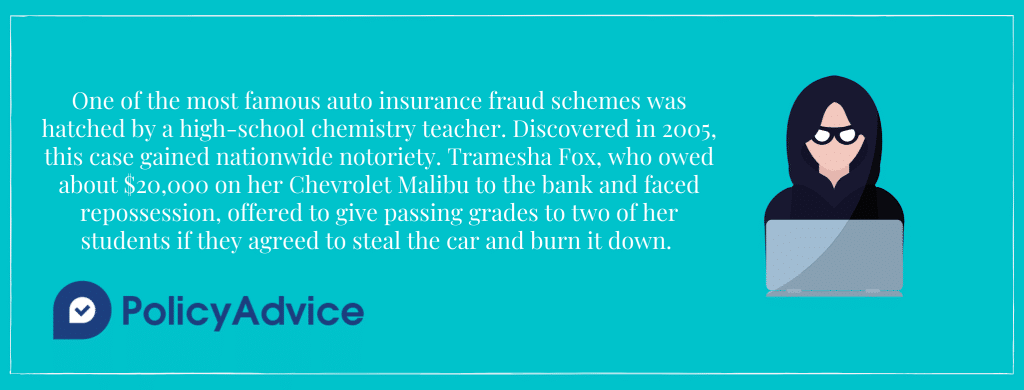
- One of the most famous auto insurance fraud schemes was hatched by a high-school chemistry teacher. Discovered in 2005, this case gained nationwide notoriety. Tramesha Fox, who owed about $20,000 on her Chevrolet Malibu to the bank and faced repossession, offered to give passing grades to two of her students if they agreed to steal the car and burn it down. Of course, they were caught, placed on four years’ probation, and made to pay $4,500 in restitution. Fox lost her job and served a 90-day prison sentence.
- New York follows the no-fault insurance law, which leads to common insurance fraud. A car accident victim insured under this law is entitled up to $50,000 in benefits regardless of whose fault the accident is.
In 2012, the largest-ever fraud exploiting this law was uncovered. Ambulance chasers were convincing real car accident victims to seek needless procedures at hospitals in exchange for a cut of the insurance payout. Doctors and the other people involved in the fraud got most of the money, while insurance companies lost millions.
Reporting Auto Insurance Fraud
Reporting fraud, whether committed by customers or insurance agents, is important because it keeps insurance premiums down and saves public money from being lost to crime.
Here are some of the steps you can take in the process of reporting cases of fraud:
- Understand the ways in which fraud can be committed.
- If you have identified an automotive insurance fraud, gather as much information on it as possible. The more documentation you have to back up your case, the easier it is for investigation agencies to follow up. This information taken in case of a vehicle insurance fraud usually includes:
- dates and names
- contact details
- details of insurance agents
- the amount of money involved
- If you or someone you know has been the victim of auto insurance fraud, you can call up the concerned insurance company after collecting the necessary documentation. Most insurance companies have internal anti-fraud teams to look into such cases.
- If you are unsure about where to report insurance fraud, the best option is to contact the National Insurance Crime Bureau (NICB), a non-profit organization working toward combating insurance-related crimes. NICB can be reached at (800) 835-6422 or through their online reporting tool. You even have the option of making the report anonymously.
- Another option is to report to your state’s insurance fraud bureau. These government-funded teams are responsible for the prevention, detection, and investigation of insurance fraud cases and welcome citizen tips. The details of these bureaus are given here.
Auto Insurance Fraud Investigation
Insurance fraud investigation is carried out to ensure that the claims submitted following an incident are not false or inflated. Given the high prevalence of insurance fraud, it is very common for insurance companies to carry out this process so that they don’t have to pay any more than they absolutely have to.
Private agents can also carry out car insurance fraud investigations. This is most likely to happen in two cases.
First, when you are accused of insurance fraud, and want to furnish enough evidence to disprove this and get the payout you deserve.
Second, when you are the victim of possible insurance fraud. For example, you are involved in a car accident where the other driver is at fault but is trying to implicate you.
The key step in the process followed by an auto insurance fraud investigator is the collection of information. The techniques used for this include:
- Surveillance
- Medical history search
- Previous claims search
- Insurance coverage analysis
- Witness interviews
- Physician’s billing analysis
- Claimant background check
If you are the subject of an investigation, which can happen even if your claim is perfectly genuine, it helps if you have all the required documentation, including police reports, car repair bills, and hospital bills. It also helps to have photos of vehicular and personal damage.
In some cases, you might require the help of an auto insurance fraud attorney. These cases include those involving serious vehicle damage/personal injury, excessive delay in claim processing, or negotiation to arrive at the final claim value.
Auto Insurance Fraud Cases in the US
Given below are some important statistics related to insurance fraud cases in the US.
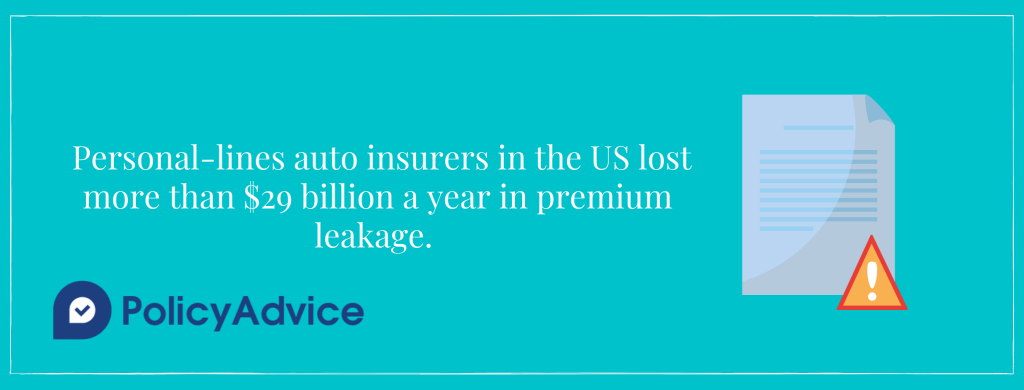
1. Personal-lines auto insurers in the US lose more than $29 billion a year in premium leakage.
Omitted or misstated information leads to inaccurate premium rates which brings losses for insurers. This, in turn, affects the premiums policyholders have to pay, in general.
As per auto insurance fraud statistics, the main types of misinformation that lead to premium leakage include unrecognized drivers, underestimated mileage, prior violations, and false garaging.
2. In 2016, fraud accounted for between 15% and 17% of total claims payments for auto insurance bodily injury.
It is difficult to estimate the resources lost to fraud, as the actually identified cases are considered a small portion of the total number of auto insurance scams being run. There have been periodic studies, however, that have tried to attribute a number to these losses.
For example, according to another study by the Insurance Research Council, between $5.6 billion and $7.7 billion was fraudulently added to paid claims for auto insurance bodily injury payments in 2012. This was a sizable increase from between $4.3 billion and $5.8 billion in 2002, according to another insurance fraud report from the same agency.
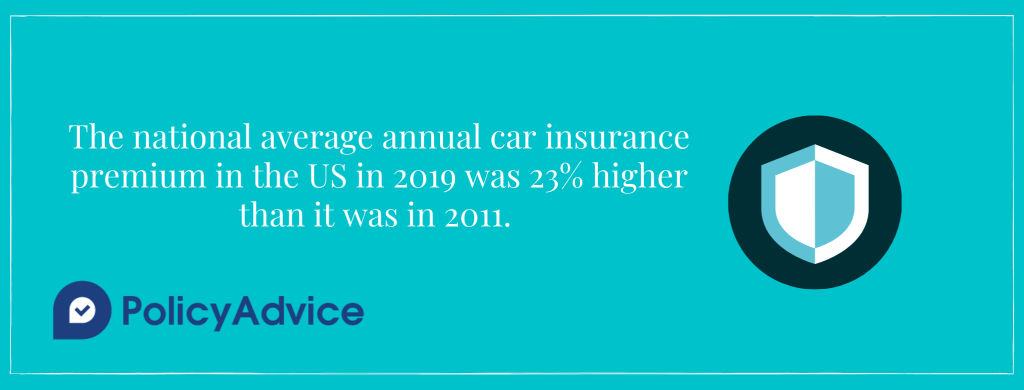
3.The national average annual car insurance premium in the US in 2019 was 23% higher than it was in 2011.
The average premium in 2019 was $1,470, higher than ever before. In fact, some US cities have average rates of more than $6,000 per year. One of the main reasons for the continuous increase in premiums is the rising cost of vehicle insurance fraud.
Since insurance companies raise overall premiums to account for the unexpected spike in payouts caused by fraudulent claims, it is in the general interest that people report cases of fraud.
4.No-fault scams are believed to have cost New Yorkers almost $2 billion between 2009 and 2018.
No-fault car insurance, introduced in the 1970s and currently available in 12 states and Puerto Rico, requires every driver to file a claim for bodily injury and medical expenses after a car accident, irrespective of who is at fault.
Originally meant to reduce the number of lawsuits in small claims courts, this policy has been misused by scammers over the years. This type of auto insurance fraud in New York and other states following the no-fault insurance policy is one of the main reasons for the high auto insurance premiums in these locations.
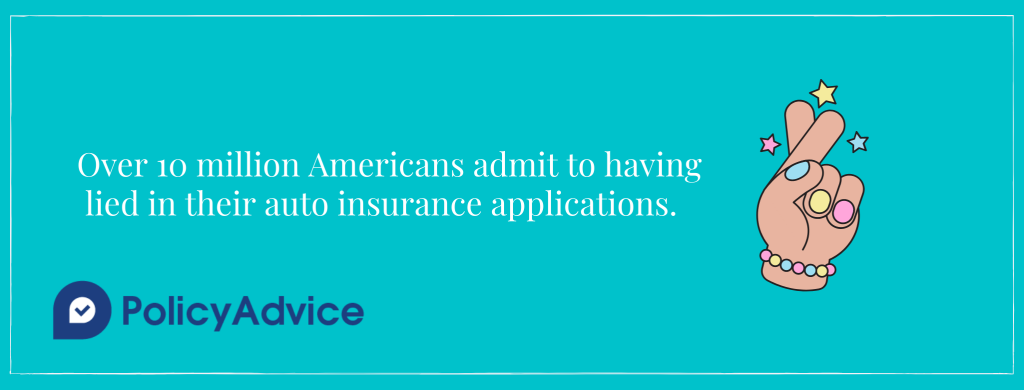
5. Over 10 million Americans admit to having lied in their auto insurance applications.
Insurance fraud is the costliest white-collar crime in the US after tax evasion. However, despite its significant costs, people’s attitude toward it is quite different compared to other crimes. Auto insurance fraud statistics show that of the 35 million Americans who admit to providing misinformation on insurance applications, the largest (29%) have done so for auto insurance.
The perception of insurance fraud as a victimless crime is what drives so many people to be involved in it. According to another data point from the Coalition Against Insurance Fraud, 1 in 5 Americans find it acceptable to plot against insurance companies, assumed to have bottomless pockets, under certain conditions.
Tips to Avoid Automobile Insurance Frauds
The first step in avoiding insurance fraud is to conduct a thorough background check on your insurance provider. This includes the insurance company, the agent, and any other intermediaries involved. Go through the documentation properly to avoid any unforeseen issues later.
Avoid tailgating and be aware of any vehicles following your car too closely if you want to avoid getting involved in car accidents staged by car insurance scammers.
If you are involved in a car accident, here are a few things that can minimize the risk of finding yourself being defrauded:
- Collect the other driver’s information and details of the vehicle. If there are other passengers and witnesses, collect their information, as well.
- Photograph the scene, including the damage caused to the vehicles involved.
- Ask your insurance provider for a list of preferred auto shops. Do not accept offers from the other driver or witnesses to be taken to a body shop. Avoid people who randomly appear at crash sites and try directing you to a repair shop, doctor, attorney, or automotive insurance specialist.
- Make sure all bills are detailed and accurate and medical procedures offered are needed. Avoid doctors who insist on filing a personal injury claim, particularly if you are not hurt. Read any form thoroughly before agreeing to sign it.
- Inform the police, even if there’s minor damage, and collect a report with the officer’s name. Do not take directions for the next steps from anyone other than a police officer.
- Report the incident to your insurance agency as soon as possible, even if you are not at fault and do not suspect any car insurance scams.
Final Word
The intent of this article is to make you more familiar with the different ways in which insurance fraud schemes can target you. It should also help you be more careful when filling up an insurance form, filing a claim, or dealing with any other steps in the auto insurance process.
Vigilance, after all, is the best way to tackle the major problem of auto insurance fraud. Also needed is the awareness that this problem impacts every citizen, making it a crime as serious as any other.
FAQs
Is insurance fraud illegal?
Yes, insurance fraud is illegal and is recognized as a serious crime. In the US, both state and federal laws prohibit insurance fraud, with enhanced sentences for fraud cases where the scheme results in injury or death. For car insurance frauds, punishment can range from simple cancellation of the policy to even a jail term.
What are the different types of insurance frauds?
Insurance fraud is broadly categorized into hard and soft frauds. Soft fraud is a crime of opportunity involving false information or exaggerated claims. Hard fraud involves the deliberate invention of an insurable loss, such as a fire, theft, or accident, to obtain a payout from an insurance provider.
What consequences are there for lying to my insurance company?
Car insurance fraud includes lying to or withholding pertinent information from your insurance company, which can result in a number of serious consequences. These include:
- Cancellation of your insurance policy
- Denial of your claims
- Increase in your insurance premiums
- Denials of insurance in the future
- Fines and financial penalties
- Criminal penalties and a permanent criminal record
In which claim do most frauds occur?
The most common frauds in the US involve cases of auto insurance fraud, health insurance fraud, and staged home fires or storms.
